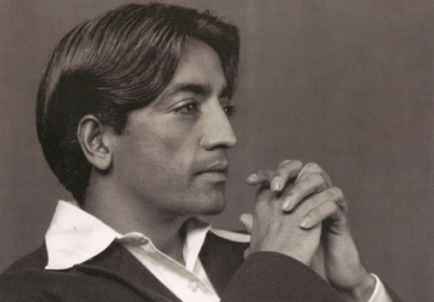Krishnamurti
In observing there is always the observer. The observer who, with his prejudices, with his conditioning, with his fears and guilts and all the rest of it, he is the observer, the censor, and through his eyes he looks, and therefore he is really not looking at all, he is merely coming to conclusions based upon his past experiences and knowledge.
The past experiences, conclusions and knowledge prevent actually seeing. And when there is such an observer, what he observers is something different, or something which he has to conquer, or change and so on; whereas if the observer is the observed – I think this is really a radical thing to understand, really the most important thing to understand if we are going to discuss anything seriously: that in us there is this division, this contradiction, the observer and the many fragments which he observes.
The many fragments make up the ‘me’, the ego, the personality, whatever you like to call it, the many fragments. And one of the fragments becomes the observer or the censor, and that fragment looks over the various other fragments. Do not agree or disagree but observe this fact that is going on within oneself; it becomes terribly interesting and rather fun if you go at it very, very seriously.
We are made up of many fragments, each contradicting the other, both linguistically, factually and theoretically, contradictory desires, contradictory pursuits, ambitions that deny affection, love and so on – one is aware of these fragments. And who is the observer who decides what he should do, what he should think, what he should become? Surely one of the fragments. He becomes the analyser, he assumes the authority.
One fragment, among the many other fragments, assumes the censorship, and he becomes the actor, the doer, compelling other fragments to conform and therefore brings about contradiction. I don’t know if we see this very clearly. Then what is one to do, knowing most of us are made up of these many fragments, which fragment is to act? Or are all the fragments to act? Or action by any one of the fragments brings about contradiction, conflict and therefore confusion. Right? Are we communicating with each other?
Communication being thinking together, not only verbally but understanding together, going together, creating together. One fragment believes in god, or doesn’t believe in god, and another fragment wants a security, not only physical but psychological security. One fragment is afraid, another fragment tries to dominate that fear. Seeing this extraordinary contradiction in ourselves what is one to do? The fragments cannot be integrated, which implies there is an integrator. That is, the integrator becomes another fragment. So it is not integration, it is not one fragment which assumes superior position as the higher self, or the most intellectual thing and dominates the rest; or one fragment which feels greatly emotional and tries to function along emotional lines.
So seeing this very clearly, what is the action that will be total, that will not be contradictory? And who is it that is seeing the whole fragments? Is it another fragment that says, ‘I observe all the many other fragments’? Are we moving together? Or there is only observation without the observer.
Is there an observation, the seeing, without the ‘me’ as the observer seeing? And therefore creating a duality, a division. That is really our problem, isn’t it, basically?
Excerpted from Public Talk 1 Brockwood Park, England – 05 September 1970. The 126th birth anniversary of J. Krishnamurti was observed on May 11.







